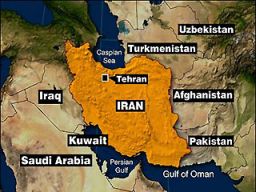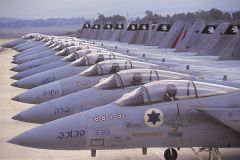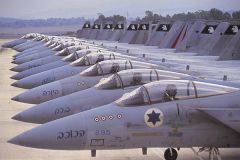
|
NEDERLANDS | ENGLISH
|
|
|
28 September 2007 |
 mail this article
| mail this article
|
 print
| print
|  
This article is part of the series: The coming war against Iran
[ 1 - 2 - 3 - 4 - 5 - 6 - 7 - 8 - 9 - 10 - 11 - 12 - 13 - 14 - 15 - 16 - 17 - 18 - 19 - 20 - 21 - 22 - 23 - 24 - 25 - 26 - 27 - 28 - 29 - 30 - 31 - 32 - 33 - 34 - 35 - 36 - 37 - 38 - 39 - 40 - 41 - 42 - 43 - 44 - 45 ]
The next step in the neoconservative march on Iran
By Daan de Wit
This article has been translated into English by Ben Kearney. While the unrest slowly but steadily increases on the surface and the pressure on Iran grows via sanctions and tough statements from both sides, faith in a diplomatic solution has rapidly declined. The pressure will further intensify out in the open, but behind the scenes there isn't much credibility being given to this route. The ones involved are instead taking stock by further preparing themselves for a war with Iran. The next step in the neoconservative march on Iran has been taken. Newsweek writes: 'In Washington [...] the consensus against a strike is firmer than most people realize. Similar commentary can be heard coming from Israel: '"Two thousand seven is the year you determine whether diplomatic efforts will stop Iran," says a well-placed Israeli source [...]. "If by the end of the year that's not working, 2008 becomes the year you take action."' 'The balance in the internal White House debate over Iran has shifted back in favour of military action before President George Bush leaves office [...]', writes The Guardian. 'Pentagon planners have developed a list of up to 2,000 bombing targets in Iran, amid growing fears among serving officers that diplomatic efforts to slow Iran's nuclear weapons programme are doomed to fail', reports The Telegraph. It is unlikely that Iran will not be attacked. The question is when. In order to prevent his book on Iran from being overtaken by events, former CIA agent Robert Baer was advised to make haste. He expects an attack within the next half a year. The ultimate deadline: November 2008  Though predictions are unwise, there is one deadline that everyone is consumed with - the American presidential elections in November of 2008: '[...] according to a well-placed Bush administration source, "everyone in town" is now participating in a broad discussion about the costs and benefits of military action against Iran, with the likely timeframe for any such course of action being over the next eight to 10 months, after the presidential primaries have probably been decided, but well before the November 2008 elections', writes Fox News. The Guardian: 'A well-placed source in Washington said: "Bush is not going to leave office with Iran still in limbo."' The conservative Pat Buchanan writes: '[...] Bush is now moving into Phase III in his War on Terror: First, Afghanistan, then Iraq, then Iran.' Though predictions are unwise, there is one deadline that everyone is consumed with - the American presidential elections in November of 2008: '[...] according to a well-placed Bush administration source, "everyone in town" is now participating in a broad discussion about the costs and benefits of military action against Iran, with the likely timeframe for any such course of action being over the next eight to 10 months, after the presidential primaries have probably been decided, but well before the November 2008 elections', writes Fox News. The Guardian: 'A well-placed source in Washington said: "Bush is not going to leave office with Iran still in limbo."' The conservative Pat Buchanan writes: '[...] Bush is now moving into Phase III in his War on Terror: First, Afghanistan, then Iraq, then Iran.' No hope left for diplomacy Because of the situation in Iraq and the scant enthusiasm among the upper ranks of the military for taking on an additional burden by attacking Iran, the members of Secretary of State Condoleeza Rice's circle got some room to work with. Having been unable to take advantage of this and with her star fading, Vice President Cheney's iron-clad vision is beginning to get the upper hand. In the meantime the issue of Iran has never been taken off the table, and following a brief flanking manoeuver, the neoconservative government is once again on a collision course. The Telegraph writes: 'Now it has emerged that Condoleezza Rice, the secretary of state, who has been pushing for a diplomatic solution, is prepared to settle her differences with Vice-President Dick Cheney and sanction military action. [...] A State Department source familiar with White House discussions said that Miss Rice, under pressure from senior counter-proliferation officials to acknowledge that military action may be necessary, is now working with Mr Cheney to find a way to reconcile their positions and present a united front to the President. The source said: "When you go down there and see the body language, you can see that Cheney is still The Man. Condi pushed for diplomacy but she is no dove. If it becomes necessary she will be on board.' The view in the Arab world seems to be that Rice is on board. The Inter Press Service did the rounds among Arab political experts and revealed that the recent tour by Rice and Defense Secretary Robert Gates of the Middle East was seen as an attempt at gathering support for an American attack on Iran: 'According to local observers [...] the overriding objective of the visit - and of the proposed arms deals - was to promote a Sunni-Arab axis against Iran, which Rice has described as the primary "strategic challenge" to the U.S.' Chance incident or false flag prelude to Iran war Any objection to a military attack that remains in Washington will melt away like snow in the midday sun in the event of an attack against the U.S. that can be attributed to Iran. Such an attack has already been sought and has been forced, but has so far not taken place. It will take place one way or another, but will more than likely be contrived than found. When that happens it will have such an impact that it will be obvious not only for Washington but for the rest of America and the world as well that a military response is unavoidable. It will again be up to the future to demonstrate how history has once again repeated itself, from Iraq in 1990 and 2003, to Lebanon and Hezbollah in 2006, from 9/11 to the Gulf of Tonkin to Pearl Harbor, and so on. Even the moderate foreign policy expert Steve Clemons, and even in his article entitled Why Bush Won't Attack Iran, considers the possibility of a conflict between the U.S. and Iran that is forced by the U.S. - more specifically originating in the Cheney camp. He writes '[...] the president is not planning to bomb Iran. But there are several not-unrelated scenarios under which it might happen, if the neocon wing of the party, led by Vice President Cheney, succeeds in reasserting itself, or if there is some kind of "accidental," perhaps contrived, confrontation.' 'His gravest concern', reports The Raw Story after interviewing Clemons, 'was that the US might seize on an accidental incident -- such as a collision between a US and Iranian ship or a border skirmish between Iraq and Iran -- as a causis belli.' Clemons' thoughts were being fed by a round table held by the New America Foundation that he presided over in August of last year. Eighteen people took part, among them Zbigniew Brzezinski, National Security advisor under President Carter, and Brent Scowcroft, who held the same position under President Ford and the former President Bush. Also present was Benazir Bhutto, the former premier of Pakistan. Scowcroft expressed the hope that the Bush Administration would forgo a new confrontation in the Middle East, this time with Iran. Brzezinski is less hopeful. He thinks that the neoconservative administration in the White House has taken a path that has only one destination: a military attack on nuclear targets in Iran; a 'catastrophe' is how he refers to it in an interview with CNN. In a vote it appeared that the participants at the conference were largely of the mind that Brzezinski's opinion is the correct one; 'Scowcroft got only two votes, including his own. Everyone else at the table shared Brzezinski's fear that a U.S. strike against Iran is around the corner.'  Clemons: 'A mistake in the Gulf where ships collide or US soldiers are attacked or Israel fires a low-level cruise missile attack against Natanz or there's a border skirmish between Iraq and Iran that results in the death of a high-ranking military or diplomatic official - any of these could spark a conflict'. In the Gulf, on board the USS John C. Stennis, the LA Times reports : 'On the ship's computer maps, a thick black line delineates Iranian coastal waters from the rest of the gulf. Shades of gray mark the waters off Saudi Arabia and the United Arab Emirates, allies of the United States. U.S. pilots are told to stay well away from Iranian airspace. "We do worry about miscalculations," [Vice Adm. Kevin J.] Cosgriff said. "That's one of the reasons we want to be transparent on the radio and be talking to them a lot."' Clemons: 'A mistake in the Gulf where ships collide or US soldiers are attacked or Israel fires a low-level cruise missile attack against Natanz or there's a border skirmish between Iraq and Iran that results in the death of a high-ranking military or diplomatic official - any of these could spark a conflict'. In the Gulf, on board the USS John C. Stennis, the LA Times reports : 'On the ship's computer maps, a thick black line delineates Iranian coastal waters from the rest of the gulf. Shades of gray mark the waters off Saudi Arabia and the United Arab Emirates, allies of the United States. U.S. pilots are told to stay well away from Iranian airspace. "We do worry about miscalculations," [Vice Adm. Kevin J.] Cosgriff said. "That's one of the reasons we want to be transparent on the radio and be talking to them a lot."' But the question is whether or not an administration with a vice president like Dick Cheney - who will be replaced next year - is going to patiently wait for accidental conflict. As was shown in the previous part in this series, Brzezinki isn't so sure about this. He is taking the possibility of a false flag operation into consideration, which in this case would be an attack that Iran gets blamed for, and for which the U.S. would then have reason to retaliate. Preparations for critical incident A variation of a critical incident such as a false flag operation seems already to have been considered by vice president  Dick Cheney. David Wurmser, up until recently Middle East advisor to Dick Cheney, said his superior pondered the idea of pushing for limited airstrikes by Israel on nuclear installations in Iran. The rational behind this was to provoke Iran into retaliating, which would then necessitate a military attack by the U.S. In the meantime, with the approval and help of the U.S., Israel carried out an attack under code name Operation Orchard on a location in Syria where a nuclear program was supposedly being worked on with help from the North Koreans. Israeli commandos in Syria were said to have uncovered nuclear-related material. Dick Cheney. David Wurmser, up until recently Middle East advisor to Dick Cheney, said his superior pondered the idea of pushing for limited airstrikes by Israel on nuclear installations in Iran. The rational behind this was to provoke Iran into retaliating, which would then necessitate a military attack by the U.S. In the meantime, with the approval and help of the U.S., Israel carried out an attack under code name Operation Orchard on a location in Syria where a nuclear program was supposedly being worked on with help from the North Koreans. Israeli commandos in Syria were said to have uncovered nuclear-related material. Based on its sources, Newsweek is declining to commit itself to the trustworthiness of reports regarding the link between Syria, North Korea and nuclear assistance. The Observer is also taking into consideration the possibility of a neoconservative spin that is weaving a web of lies and which calls to mind memories of the build-up to the last war - the one against Iraq: 'Underlying all the accusations was a suggestion that recalled the bogus intelligence claims that led to the war against Iraq: that the three countries might be collaborating to supply an unconventional weapon to Hizbollah.' Back then there was the Office of Special Plans, which was aimed at the creation of disinformation, and now there is the Iranian Directorate. It's unknown whether this organization has anything to do with the origin of the story about the attack on Syria. Joseph Cirincione, Director of Nuclear Policy at the Center for American Progress and author of the book Bomb Scare: The History and Future of Nuclear Weapons, is clear on this point: 'This story is nonsense. The Washington Post story should have been headlined "White House Officials Try to Push North Korea-Syria Connection." This is a political story, not a threat story. The mainstream media seems to have learned nothing from the run-up to war in Iraq. [...] Once again, this appears to be the work of a small group of officials leaking cherry-picked, unvetted "intelligence" to key reporters in order to promote a preexisting political agenda. If this sounds like the run-up to the war in Iraq, it should.' The Israeli attack prompted Newsweek into the headline: 'Israels Raid on Syria: Prelude to Nuke Crisis?' The question that The Observer poses is: was Operation Orchard also an exercise for an attack on Iran? The Times writes: 'As a bonus, the Israelis proved they could penetrate the Syrian air  defence system, which is stronger than the one protecting Iranian nuclear sites.' The Observer: 'Whatever the truth of the allegations against Syria - and Israel has a long history of employing complex deceptions in its operations - the message being delivered from Tel Aviv is clear: if Syria's ally, Iran, comes close to acquiring a nuclear weapon, and the world fails to prevent it, either through diplomatic or military means, then Israel will stop it on its own. So Operation Orchard can be seen as a dry run, a raid using the same heavily modified long-range aircraft, procured specifically from the US with Iran's nuclear sites in mind. It reminds both Iran and Syria of the supremacy of its aircraft and appears to be designed to deter Syria from getting involved in the event of a raid on Iran - a reminder, if it were required, that if Israel's ground forces were humiliated in the second Lebanese war its airforce remains potent, powerful and unchallenged.' defence system, which is stronger than the one protecting Iranian nuclear sites.' The Observer: 'Whatever the truth of the allegations against Syria - and Israel has a long history of employing complex deceptions in its operations - the message being delivered from Tel Aviv is clear: if Syria's ally, Iran, comes close to acquiring a nuclear weapon, and the world fails to prevent it, either through diplomatic or military means, then Israel will stop it on its own. So Operation Orchard can be seen as a dry run, a raid using the same heavily modified long-range aircraft, procured specifically from the US with Iran's nuclear sites in mind. It reminds both Iran and Syria of the supremacy of its aircraft and appears to be designed to deter Syria from getting involved in the event of a raid on Iran - a reminder, if it were required, that if Israel's ground forces were humiliated in the second Lebanese war its airforce remains potent, powerful and unchallenged.' It's not going to depend on Israel's motivation; Israel has even tried to talk the U.S. into invading not Iraq, but Iran. With a nuclear Iran, Israel loses its nuclear monopoly in the region. It probably isn't going to depend on Premier Olmert of Israel either - he is one who could use some successes following the setback against Hezbollah in Lebanon. 'When Prime Minister Ehud Olmert ordered the raid on Syria earlier this month, his approval rating was in the teens. Since then, it has jumped to nearly 30 percent. And though Olmert may not believe Israeli warplanes can get to all the targets, he might be willing to gamble on even a limited success. "No one in their right mind thinks that there's a clinical way to totally destroy the Iranian nuclear facilities," says the well-placed Israeli source. "You strike at some and set the project back. You play for time and hope Ahmadinejad will eventually fall"', writes Newsweek.
____________________________________________________________________________
DeepJournal Sign up for the free mailing list. |